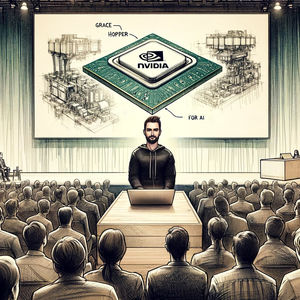NVIDIA Grace Hopper Superchip demo workshop

When
Where
Event language(s)
On Grace Hopper: The NVIDIA Grace Hopper™ architecture brings together the groundbreaking performance of the NVIDIA Hopper™ GPU with the versatility of the NVIDIA Grace™ CPU in a single superchip, connected with the high-bandwidth, low-latency, memory-coherent NVIDIA® NVLink® Chip-2-Chip (C2C) interconnect. The NVIDIA NVLink-C2C delivers up to 900 gigabytes per second (GB/s) of total bandwidth, which is 7X higher than PCIe Gen5 lanes commonly used in accelerated systems. NVLink-C2C enables applications to oversubscribe the GPU’s memory and directly utilize the Grace CPU’s memory at high bandwidth. With up to 480GB of LPDDR5X CPU memory per GH200 Grace Hopper Superchip, the GPU has direct access to 7X more fast memory than HMB3 or almost 8X more fast memory than HBM3e, depending on the GH200 memory configured.
10:00-11:00 Grace Hopper Superchip presentation
Introduction to the new hardware and capabilities
Unified memory model
Software stack
11:00-13:00 Interactive Grace Hopper live demo
Unified memory model in practice (with CUDA, CuPy …)
Leveraging the large host memory with LLMs (pytorch)
Other examples e.g. spatio-temporal Gaussian processes (Jax) on Grace Hopper
Application round table - let us know about your potential applications!
Bio: Niki Loppi is an AI/HPC solutions architect at NVIDIA Helsinki, helping academic researchers to leverage NVIDIA’s technology stack through the NVIDIA AI Technology Center program. Prior to joining NVIDIA, he worked as a researcher in the Department of Aeronautics at Imperial College London, where he also obtained his PhD in Computational Fluid Dynamics. Specifically, his research focused on the development of high-order accurate numerical methods for solving large-scale incompressible fluid flow problems using massively parallel modern GPU architectures. Currently, Niki is particularly interested in physics-informed neural networks and scientific ML in general.
Department of Computer Science
We are an internationally-oriented community and home to world-class research in modern computer science.






